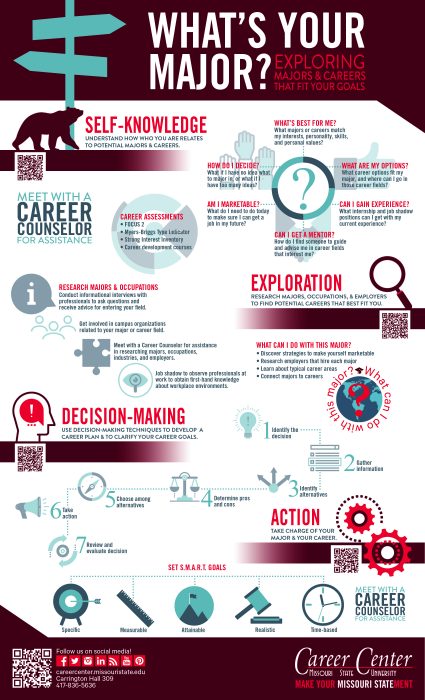Written by Amie Case, Graduate Assistant with the Career Center, Master of Arts, English: Creative Writing.
If you are overwhelmed or uncertain about your major, understanding the career development process can alleviate much of your stress. You will have more control over your decision if you follow this process while exploring majors and careers that fit your goals. Career development is an ongoing process consisting of four main recurring steps: self-knowledge, exploration, decision-making, and action.

Self-knowledge
Don’t underestimate the importance of understanding how your personality, values, strengths, and interests relate to potential majors and careers. Learn more about careers that would be a good fit for you by asking questions.
- How do I decide? What if I have no idea what to major in, or what if I have too many ideas?
- What’s best for me? What majors or careers match my interests, personality, skills, and personal values?
- What are my options? What career options fit my major, and where can I go in those career fields?
- Can I gain experience? What internship and job shadow positions can I get with my current experience?
- Can I get a mentor? How do I find someone to guide and advise me in career fields that interest me?
- Am I marketable? What do I need to do today to make sure I can get a job in my future?
A Career Resources Specialist at the Missouri State University Career Center can assist you in answering these questions and more. You can also gain self-knowledge through career assessments and career development courses.
Exploration
Use self-knowledge to research and gather information on potential majors, occupations, and employers.
Gather information
- Conduct informational interviews with professionals to ask questions and receive advice for entering your field.
- Get involved in campus organizations related to your major or career field.
- Meet with a Career Resources Specialist for assistance in researching majors, occupations, industries, and employers.
- Job shadow to observe professionals at work and obtain first-hand knowledge about workplace environments.
What can I do with this major? is a powerful exploration tool to help you . . .
- Connect majors to careers
- Learn about typical career areas
- Research employers that hire each major
- Discover strategies to make yourself marketable
Decision-making
Use decision-making techniques to develop a career plan and to clarify your career goals.
- Identify the decision
- Gather information
- Identify alternatives
- Determine pros and cons
- Choose among alternatives
- Take action
- Review and evaluate decision
Action
Take charge of your major and your career by setting S.M.A.R.T. goals to obtain your objectives:
- Specific – What is your specific goal? Be a precise as possible. Answer who, what, when, where and why.
- Measurable – How do you measure success? How will you know when you have reached your goal? Your measurement needs to be precise and answer the question of “how many” or “how often.”
- Attainable – Make sure your goal is attainable and realistic. If it isn’t, it will always remain a dream. While setting high standards is important, if the standards are unrealistic, then they probably will not be achieved.
- Realistic – Does your goal align with your other goals and your values? If it conflicts with your vision of yourself or your short- or long-term plans, then you should reassess the goal.
- Time-based – Set a deadline for achieving your goal. If your goal includes steps or milestones, make a timeframe for them as well. Again, be precise. If your deadline is a vague “sometime in the future,” then your goal may always remain a dream.
Career counseling appointments at the Missouri State University Career Center are free to MSU students and alumni.
Want more career tips and advice? Subscribe to the Career Centered Newsletter and follow us on social media!
